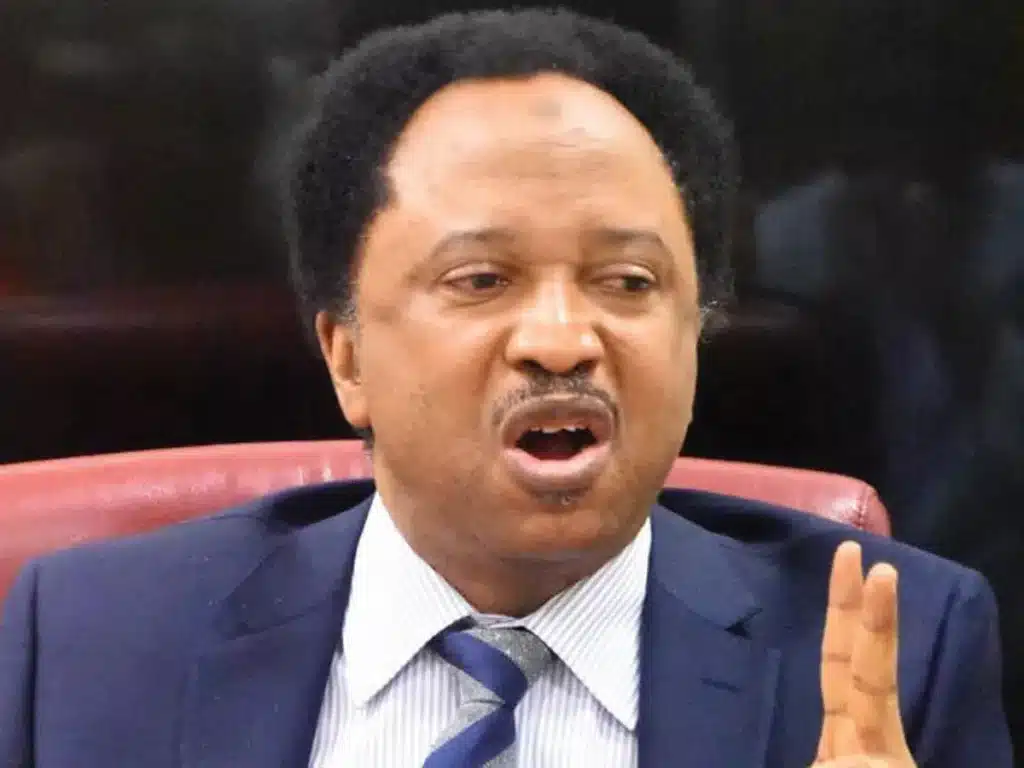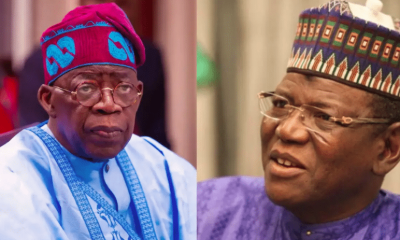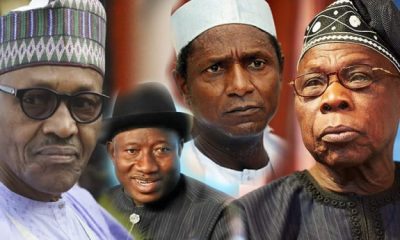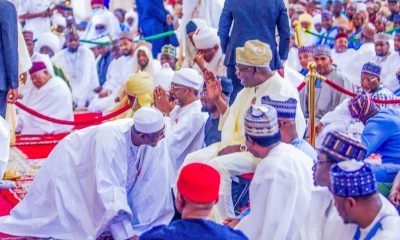News
This Power Rotation Thing Again
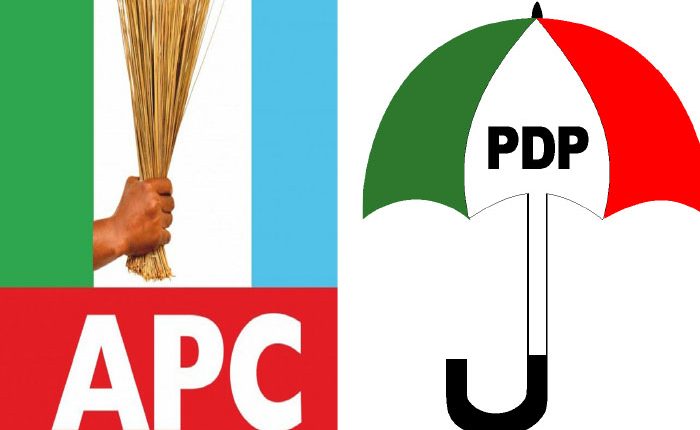
By Simon Kolawole
Mallam Mamman Daura, President Muhammadu Buhari’s confidant, is someone who speaks just once in a blue moon. He hardly grants media interviews or appears at public events. Only a few Nigerians can point him out in a crowd. A Google image search will return less than a dozen pictures of him. For a man who was a journalist, editor, corporate player and entrepreneur in his younger days, this anonymity is very much unusual — just as it is uncommon for you to be older than your uncle. Technically, Buhari is his uncle, even though the president is younger. Daura’s father is the first child of Buhari’s mother. Daura, at 80, is the nephew and Buhari, at 77, is the uncle.
The word in town since Buhari came to office in 2015 is that Daura is the power behind the throne. But in a rare interview with the BBC Hausa Service last week, Daura — who encouraged Buhari to join the army in 1962 — denied having any undue influence on the president, maintaining that he only advises him if he seeks his opinion. What’s more, the snippets that came out of the BBC interview also delivered what many would consider a bombshell on “power shift” in 2023: “This turn by turn, it was done once, it was done twice, it was done thrice… It is better for this country to be one… it should be for the most competent and not for someone who comes from somewhere.”
I am interested in two aspects of Daura’s statement. One, he did not specifically say power should not go to the south. He simply said we should discard “turn by turn” — which is in the same family with “federal character”. But many have taken this as a coded message. I will come back to this. Two, he said what the south normally likes to hear — that “competence” should be the key factor and not, wait for this, “turn by turn”. This still angered some southerners. On a good day, southerners argue that there should be no “turn by turn” and that “competence” should determine everything. On this occasion, it seems they prefer “turn by turn” to “competence”.
On the first point, there is a general assumption in Nigeria that the north will always determine who will be elected president. The north believes it has the numbers to always choose and it will use these numbers the way it likes. That is why Daura’s message has set the polity into overdrive: it is taken that the “north” has spoken. Of course, the north has the numbers — 19 out of 36 states and over 52 per cent of registered voters, and always with a higher voter turn-out since time immemorial. That is why when any northerner talks on this issue, the reaction in the south is always ferocious because as far as they are concerned, the north has spoken and it is fait accompli.
However, the Nigerian constitution makes it compulsory for a presidential candidate to win at least 25 percent of votes cast in a minimum of 24 states of the federation. Since the north has 19 states and the south 17, it means a region cannot by itself elect a president. We will always need each other, even if it has to come to holding a run-off in the event that no candidate meets the threshold in the first round. Moreover, I would treat Daura’s position as a personal opinion. The north is politically diverse and dynamic. The idea of a monolithic north — that is, the notion that everybody in the region faces the same direction — is not supported by history or facts.
People tend to use Buhari’s victories in 2015 and 2019 as evidence of a monolithic north. But at his best in 2015, President Muhammadu Buhari — arguably the biggest vote-winning machine that has ever come out of the region — did not win in all the states in the north. He won in 16. If the south-west had maintained its voting pattern of 2011, Buhari would have lost the historic election which saw a sitting president defeated for the first time. So, even with Buhari’s awesome electoral might, he still needed southern votes to win. It must also be noted that Obasanjo and Jonathan, two southerners, defeated Buhari in 2003 and 2011 respectively — with northern support, of course.
What am I driving at? Anyone desiring to be president must build strong alliances across the divides, as Buhari realised in 2015. For the record, the north has shown — not once, not twice — its willingness to support a southerner against one of its own. It happened in 1993, 2003 and 2011. Bashorun MKO Abiola defeated Alhaji Bashir Tofa not only in the north but also in Kano, Tofa’s home state, in the June 12 poll of 1993. The most notable development must be in 1999 when northern power brokers worked for the two presidential candidates to come from the south-west. Those who like to abuse the north over the power equation often forget or ignore these facts of history.
In essence, a better way of addressing the 2023 “power shift” issue, in my opinion, is for the southern political leaders to forge the right alliances in the north and build a consensus to zone the presidential tickets of the leading parties to the south. Resorting to threats and foul language and promising brimstone and fire will not solve any problem. These same southern leaders backed Alhaji Atiku Abubakar in 2019 and Buhari still won. The world did not come to an end. Playing politics the right way and negotiating the right alliances will work better. As I said, the north has shown willingness to support a southerner above a northerner several times in the past.
The second point is “competence”. I can’t believe that a northerner would ask that competence be used in picking the Nigerian president and some southerners would kick so hard. What’s the world turning into? All my life, I have been told that the least intelligent southerner is better than the most intelligent northerner. I have been told that northerners can only get anything if it is based on federal character or quota system and southerners will get everything if it is based on competence or merit. Therefore, shouldn’t southerners be excited that Daura said competence should decide our choice in 2023? I am slightly confused that southern leaders are kicking against competence!
Jokes apart, I have always argued that competence is in every part of Nigeria. There is no ethnic group, religion, region or state that does not have people who are qualified to lead. Be it educational qualification, experience, exposure, skills or enterprise, no ethnic group or religion has the monopoly. Maybe in 1914 or 1960, there was some monopoly. But today, it is inherited prejudice that will make anyone sit somewhere and classify everybody from a whole region as incompetent. I don’t know of any state that cannot boast of having produced graduates, home and abroad. That some states have more than the others does not mean the others are illiterate and incompetent.
So what? I return to my argument: in a multi-ethnic and multi-religious state, we cannot say might is right. We must evolve a system that accommodates and integrates all and sundry. That is the only reason I support the highly controversial federal character: our diversity must reflect in matters of mutual relevance. I don’t want to go to a federal ministry and everybody there is from my village on the claim that they were all recruited on merit. No multi-ethnic union can survive that way. We must create a sense of belonging. And I insist that since there is competence from everywhere, we can implement merit-based federal character. Let every section bring their best talents to the pool.
In the interest of national peace and unity, therefore, it makes sense for power to shift to the south in 2023. Contrary to Daura’s opinion, rotation can incorporate both “turn by turn” and “competence”. They don’t have to be mutually exclusive. There is no state in Nigeria today that does not have good presidential materials. More so, we have to manage our delicate nationhood wisely. We cannot deal with the prevailing mutual suspicion and fear of domination if we keep insisting that “might is right” or “we have the numbers”. Mallam Nasir el-Rufai, governor of Kaduna state, expressed similar sentiments early in the year and asked that power should go to the south in 2023.
Nation-building is calculated, orchestrated and nurtured. It does not happen by accident. That is why I am now thinking: is it time to entrench power rotation in our constitution? It is very clear that Nigerians love rotation of power. The only problem is that some support or oppose it depending on where they stand at a point in time. Why don’t we stop pretending and just do it? Indeed, there are too many issues that should be priorities: healthcare, security, education, infrastructure, industrialisation and inequality, among others. Bickering all the time over power is a destructive distraction. It destabilises us.
Let’s begin to devote our energies and emotions to the cause of good governance and nation-building, assured that the power formula is already taken care of. The perennial tension and mischief over the power equation is hurting national cohesion. Let’s be honest: we are yet to recover from the Yar’Adua situation of 2010. Yar’Adua’s death meant the north could not complete its eight years and the consequences are still shaping political emotions. We can amend the law such that if the president leaves office before the expiration of term, the replacement will come from the same region through a by-election. We need consensus and compromise. We badly need national healing.
Advertise or Publish a Story on EkoHot Blog:
Kindly contact us at [email protected]. Breaking stories should be sent to the above email and substantiated with pictorial evidence.
Citizen journalists will receive a token as data incentive.
Call or Whatsapp: 0803 561 7233, 0703 414 5611


